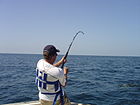
Fishing is the activity of trying to catch fish, which are often caught as wildlife from the natural environment, but may also be caught from stocked bodies of water such as ponds, canals, park wetlands and reservoirs. Fishing techniques include trawling, longlining, jigging, hand-gathering, spearing, netting, angling, shooting and trapping, as well as more destructive and often illegal techniques such as electrocution, blasting and poisoning.

Angling is a fishing technique that uses a fish hook attached to a fishing line to tether individual fish in the mouth. The fishing line is usually manipulated via a fishing rod, although rodless techniques such as handlining also exist. Modern angling rods are usually fitted with a fishing reel that functions as a cranking device for storing, retrieving and releasing out the line, although Tenkara fishing and traditional cane pole fishing are two rod-angling methods that do not use any reel. The fish hook itself can be additionally weighted with a denser tackle called a sinker, and is typically dressed with an appetizing bait to attract and entice the fish into swallowing the hook, but sometimes an inedible fake/imitation bait with multiple attached hooks is used instead of a single hook with edible bait. Some type of bite indicator, such as a float, a bell or a quiver tip, is often used to relay underwater status of the hook to the surface and alert the angler of a fish's presence.

Spearfishing is fishing using handheld elongated, sharp-pointed tools such as a spear, gig, or harpoon, to impale the fish in the body. It was one of the earliest fishing techniques used by mankind, and has been deployed in artisanal fishing throughout the world for millennia. Early civilizations were familiar with the custom of spearing fish from rivers and streams using sharpened sticks.
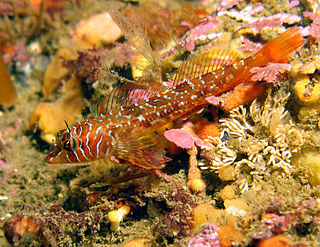
An aquatic animal is any animal, whether vertebrate or invertebrate, that lives in a body of water for all or most of its lifetime. Aquatic animals generally conduct gas exchange in water by extracting dissolved oxygen via specialised respiratory organs called gills, through the skin or across enteral mucosae, although some are evolved from terrestrial ancestors that re-adapted to aquatic environments, in which case they actually use lungs to breathe air and are essentially holding their breath when living in water. Some species of gastropod mollusc, such as the eastern emerald sea slug, are even capable of kleptoplastic photosynthesis via endosymbiosis with ingested yellow-green algae.

The freedom to roam, or everyone's right, every person's right or everyman's right, is the general public's right to access certain public or privately owned land, lakes, and rivers for recreation and exercise. The right is sometimes called the right of public access to the wilderness or the right to roam.

Recreational fishing, also called sport fishing or game fishing, is fishing for leisure, exercise or competition. It can be contrasted with commercial fishing, which is professional fishing for profit; or subsistence fishing, which is fishing for survival and livelihood.
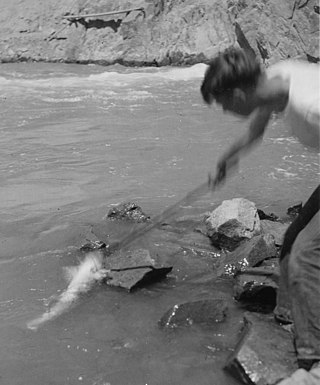
Snagging, also known as snag fishing, snatching, snatch fishing, jagging (Australia), or foul hooking, is a fishing technique for catching fish that uses sharp grappling hooks tethered to a fishing line to externally pierce into the flesh of nearby fish, without needing the fish to swallow any hook with its mouth like in angling. This is achieved by suddenly and vigorously pulling the line when movement is felt, causing the snag hook to "claw" into any fish grappled by the hook points. Weighted multi-hook rigs can be used to increase chances of success, and modern technologies such as underwater video camera can also be used to visually aid and time the snagging.

The International Game Fish Association (IGFA) is the leading authority on angling pursuits and the keeper of the most current world record fishing catches by fish categories. Fishermen who are sport fishers and anglers are careful to follow their stringent rules for fair play and line requirements in order to receive the honor of being listed in their annual "World Record Game Fishes" publication. The publication also gives fishing tips, and has an extensive fish identification guide. The IGFA is also an ardent proponent of aquatic habitat conservation, and cooperates with biologists all over the world.

Coarse fishing is a phrase commonly used in Great Britain and Ireland. It refers to the angling for rough fish, which are fish species considered undesirable as food or game fish. Freshwater game fish are all salmonids, particularly salmon, trout and char. Generally, coarse fish are freshwater fish that are not salmonids, though there is often disagreement over whether grayling should be classified as a game fish or a coarse fish.
A water bailiff is a law-enforcement officer responsible for the policing of bodies of water, such as rivers, lakes or the coast. The position has existed in many jurisdictions throughout history.

Fishing techniques are methods for catching fish. The term may also be applied to methods for catching other aquatic animals such as molluscs and edible marine invertebrates.

Lums Pond State Park is a 1,790-acre (720 ha) Delaware state park near Bear, New Castle County, Delaware in the United States. The park surrounds Lums Pond, an impoundment built by the Chesapeake and Delaware Canal on St. Georges Creek. The C&D built the pond as a source of water to fill the locks of the canal that connected the Chesapeake Bay with the Delaware River during the early 19th century. Lums Pond State Park is open for a wide variety of year-round recreation.
This page is a list of fishing topics.
The following outline is provided as an overview of and topical guide to fishing:

As with other countries, New Zealand's 200 nautical mile exclusive economic zone gives its fishing industry special fishing rights. It covers 4.1 million square kilometres. This is the sixth largest zone in the world, and is fourteen times the land area of New Zealand.
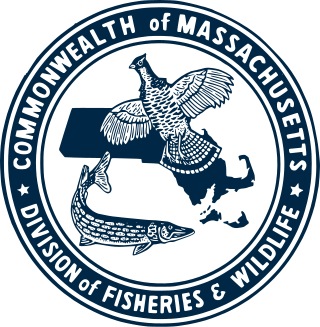
The Massachusetts Division of Fisheries and Wildlife, sometimes referred to as MassWildlife, is an agency of the Massachusetts Department of Fish and Game, within the Executive Office of Energy and Environmental Affairs. The Massachusetts Division of Fisheries and Wildlife (DFW) is responsible for the conservation - including restoration, protection and management - of fish and wildlife resources for the benefit and enjoyment of the public. MassWildlife was founded as a state fisheries commission in 1866 in response to citizen concerns about the loss of Atlantic salmon to dams and pollution. The agency's activities are mainly supported by revenue from the sale of hunting, trapping and fishing licenses, stamps and permits; returns from federal taxes on hunting and fishing equipment; various bond initiatives (primarily for land purchase. Additional funding is derived from voluntary donations from businesses, conservation organizations, and individuals.
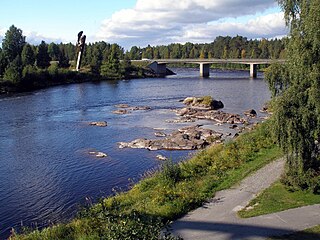
The Byske is a river in Sweden.

The fishing industry in Denmark operates around the coastline, from western Jutland to Bornholm. While the overall contribution of the fisheries sector to the country's economy is only about 0.5 percent, Denmark is ranked fifth in the world in exports of fish and fish products. Approximately 20,000 Danish people are employed in fishing, aquaculture, and related industries.
The Angling Trust, based at Leominster, Herefordshire, is an organisation formed from the merger of six angling authorities to form a single and more powerful non-profit organisation for the benefit of anglers. The body oversees the development of angling for three disciplines — coarse, sea, and game fishing. The Angling Trust was set up to promote anglers' rights, fish conservation, preservation of habitat and fish and angler welfare.

In 2021, a dispute erupted between French fishermen and the Government of Jersey about the licensing of French fishing boats to fish in Jersey's territorial waters. Jersey is a British Crown Dependency, and despite not being part of the United Kingdom, the licensing of European Union fishing boats to fish in Jersey's territorial waters has changed after the UK exit from the EU. On 6 May 2021, French fishermen held a protest in the waters off Jersey's main harbour. The UK is responsible for the defence of the Channel Islands and sent two patrol boats to Jersey in response to the fishermen's threats to blockade it. French politicians suggested that Jersey's electricity supply fed by undersea cables from France could be cut off in retaliation for Jersey placing limitations on the extent to which French boats can fish in the island's waters.


















